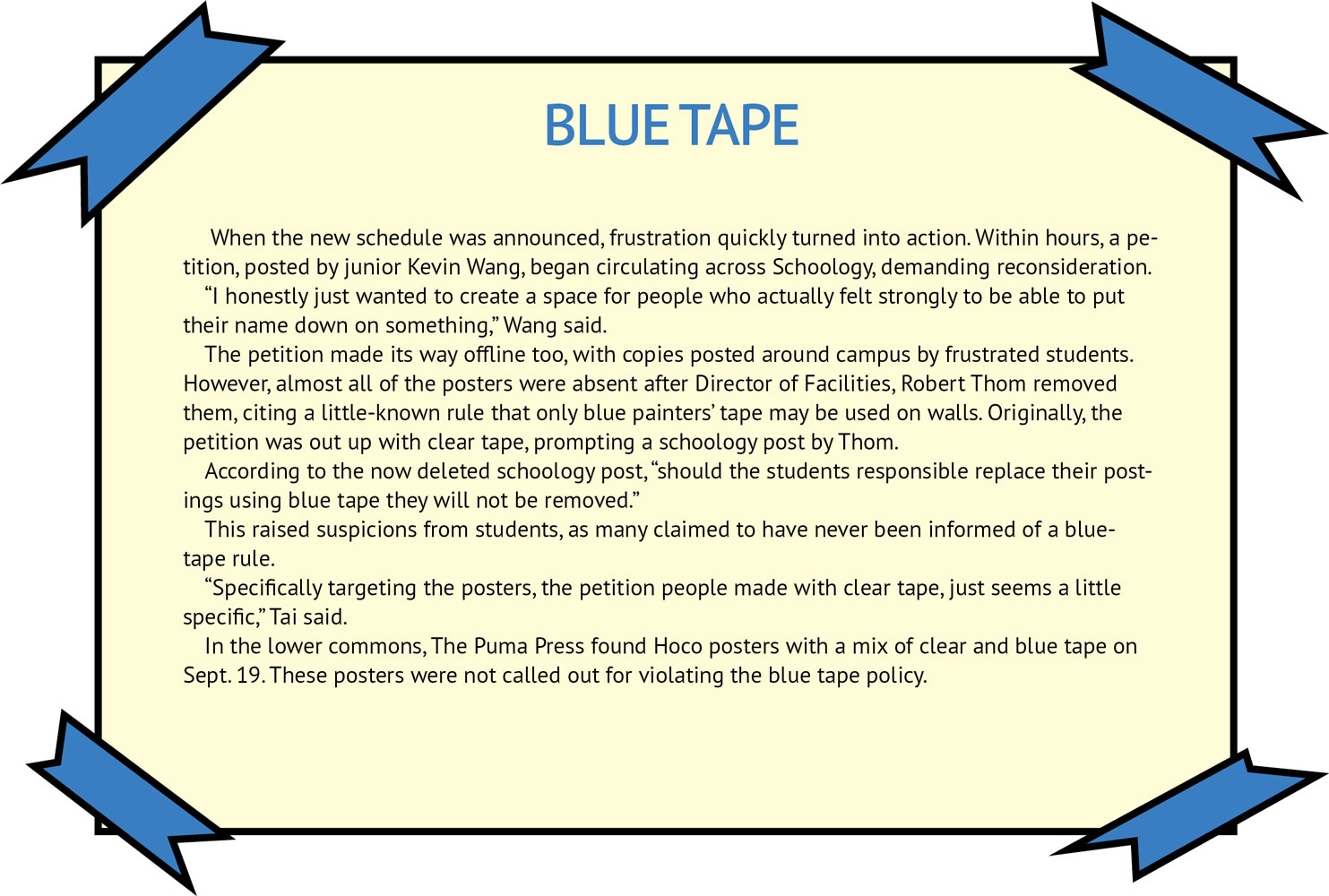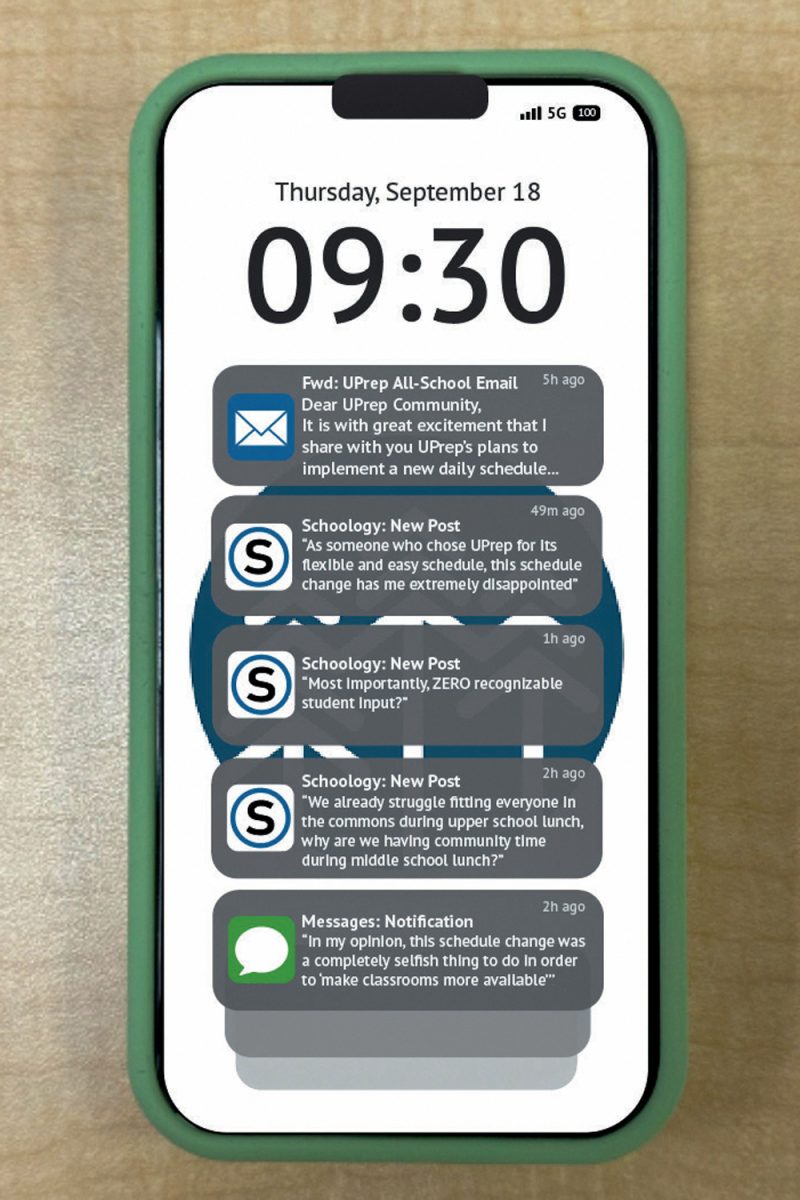“What do we think of the new schedule for the next school year?”
That was the first schedule-related message to appear on Schoology. Message after message, mostly negative, filled the Schoology home page. Posts of outrage, threats of walkouts and petitions demonstrated mixed emotions toward the change. One thing was certain: students felt disregarded and ignored, and they wanted answers.
At 4 p.m., Sept. 18, UPrep sent out an all-school email. The message notified readers of an upcoming schedule change for the 2026-2027 school year. The aftermath consisted of confusion and frustration from students on Schoology.
The current UPrep schedule has four 70-minute blocks per day and six classes per semester, with an hour for Community Time and half an hour for lunch. In contrast, the new schedule has five 60-minute blocks per day, seven classes per semester and a 45-minute lunch period right after community time. On the third day of the schedule FLEX time provides an opportunity for student clubs, affinity groups, or meetings. In addition to the class block changes, intensives will shrink to one per year during the winter.
The email announcing the major change didn’t land in students’ inboxes. Rather, it landed in faculty and parent’s inboxes. Students like sophomore Aidan Tai found out about the schedule when their guardians showed them the message.
Blindsided, Tai wondered when students were asked about changes to the schedule before the administration made a decision.
“I just feel like there was never any good place to give your input on the schedule, and we’ve been left in the dark on the possible options,” Tai said.
Junior Mica Wolf shares Tai’s frustrations with the lack of communication from the schedule change committee.
“When they’re making such a drastic change like this, I feel like it’s really important to talk to those who are going to be affected by it, “ Wolf said.
On May 28, Assistant Head of School for Academics Ed Billingslea sent out a survey for the upper school regarding the current schedule. According to Billingslea, only 234 students filled out the survey out of the 404 upper schoolers last year.
The survey results showed that 44.4% of students were satisfied with the current schedule.
Billingslea emphasizes that the survey was meant to give students an opinion on a schedule change, not control.
“The students can give input, but they don’t make decisions, “ Billingslea said. “That’s the adults job here.”
On Monday, Sept. 22, Billingslea presented the new schedule in front of the Upper School, followed by a Q&A session. Questions and accusations of zero student input echoed throughout the presentation, as upper schoolers directed their disapproval of the schedule toward Billingslea. The reaction from students left Billingslea in a state of shock and disappointment.
“Not only was Monday embarrassing, it was a sad reflection of what’s going on in this country where trolls and people are sitting behind their keyboards and just being nasty for the sake of being nasty,” Billingslea said. “I was not trying to be polarizing. I was not trying to be a lightning rod. I was just delivering the information.”
Upper school math teacher and scheduling committee member Dan Chestnut wasn’t surprised by the student body’s reaction.
“Any change was going to result in a reaction. Because, in general, change is tricky,” Chestnut said. “Usually when change happens, you think about what you’re losing, not what you’re gaining.”
Following the assembly, some students were left with high emotions and concerns. Sophomore Sophie Kung worries that the schedule will impact her rigorous training for gymnastics.
“I train five hours a day, Monday through Friday. And so I get home at 9 o’clock every night, and then I start my homework by 9:35,” Kung said. “Right now, the schedule is already hard for me, and…it’s just going to make my schedule even more complicated.”
Billingslea worked on the schedule for two years along with a scheduling committee. The changes the committee made always came back to the same question: how can UPrep’s schedule be stronger academically?
Billingslea understands student-athletes’ frustrations but reminds them that the changes focus on activities inside of UPrep.
“Our schedule is not based on if students choose to compete at Roosevelt or Lincoln. Our schedule is not predicated on if someone decides to row or ride horses,” Billingslea said. “I mean, it’s UPrep first. I mean our entity, our sports, our clubs, it’s us first.”
Billingslea sees the change as an opportunity for students to have more working time, an idea that he believes is not getting as much attention.
“Changing the schedule, we gain back two weeks of instructional time in the spring,” Billingslea said. “This schedule allows us an opportunity to get in line with national standards.”
According to The Washington State Board of Education grades 9-12 must have 1,080 instructional hours per year. The current 3-week intensive during the spring can look equivalent in hours for a class, but the requirement is based on broadly distributing access to instruction— not compressing time into one block, according to Billingslea.
Assistant Director of Upper School Meg Anderson-Johnston notes the similarities between the release of the new schedule, and the release of the current schedule .
“I’ve talked a lot with people who were here, as I was, when we decided to change the schedule to add intensives, and we were just reflecting back on how similar this feels,” Anderson-Johnston said. “Students were really unhappy about that change and did not want to go to six periods and did not want intensives.”
The Puma Press reported on the 2017 introduction to intensives, citing, from a poll of 40 upper school students, that 18% felt unexcited about the program while 52% remained indifferent.
Anderson-Johnston’s reflection raises a key question: Is student resistance to change inevitable or is this situation fundamentally different? To understand that, it’s important to look beyond UPrep’s walls.
Many peer institutions in Seattle follow similar models to UPrep’s proposed schedule rather than the current one. The Northwest School, according to its website, runs on an eight-block rotation over two weeks, where each class meets five times for 75 minutes. Their day also includes FLEX time, affinity groups, and regular community meetings.
Sophomore Noah Keppler thinks that UPrep is losing an aspect of its identity with a schedule change: intensives.
“It’s what makes our school unique,” Keppler said, “and I think it’s just a really cool experience.”
For many students, intensives and the current schedule are key to an individual learning experience that UPrep offers. Wolf remembers how UPrep admissions faculty used intensives to market the school.
“Part of the way the school advertises themselves, especially in admissions, is the schedule,” Wolf said.
Students aren’t the only UPrep members dealing with the change. Upper school science teacher Moses Rifkin notes how intensives will require all teachers to co-run a class.
“I think there’s just a lot of change ahead for teachers, and that’s going to take some time for us to get used to actually doing the work of transforming classes,” Rifkin said.
Beyond the structural changes to class blocks and intensives, one detail sparked immediate concern among students: the school day starts 15 minutes earlier. For many, those minutes represent precious morning time, a chance to sleep a little longer or a little more time when it comes to catching a bus. Upon the release of the schedule, many students at Monday’s assembly voiced concerns about the amount of sleep they would get with the new schedule.
According to the American Psychological Association, between the years 2009 and 2021, the number of high school students who were not able to get a full, healthy night of sleep increased from 69% to 77%. Nearly 70% of ninth graders failed to get enough sleep, as well as 83.5% of seniors.
Billingslea believes that later start times would not motivate students to get more sleep.
“The very thing that you need to charge your brain, your brain is also allowing you to make these decisions that are not always in your best interest, particularly when it relates to sleep,” Billingslea said.
According to the National Library of Medicine, later start times “correspond to improved attendance, less tardiness, less falling asleep in class, better grades, and fewer motor vehicle crashes.”
Left confused and annoyed, Tai wishes the school understands where their communication went wrong for the future.
““It’s really annoying to not understand what’s going on,” Tai said. “It’s even worse to not understand what’s going on when it’s something that will matter for me for the next two years, when I’ll be busy doing college apps.”
Billingslea understands students’ frustrations, and hopes that students think about the work that was put into developing the new schedule.
“This is not something that happened overnight,” Billingslea said. “There are some students that feel like there’s a lack of transparency, and I understand that, and as the adults in the building, I think primarily our job is to communicate.”
While Wolf believes that the school should have communicated better, she encourages students to reflect on their impulsive reactions to the schedule.
“I think a lot of people’s emotions are valid, and I understand why they feel frustrated and concerned about this,” Wolf said. “I think if [students] would have waited, it could have shown the administration that we are thinking clearly about this.’



